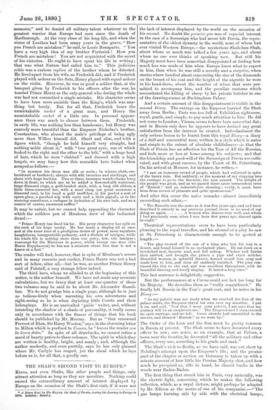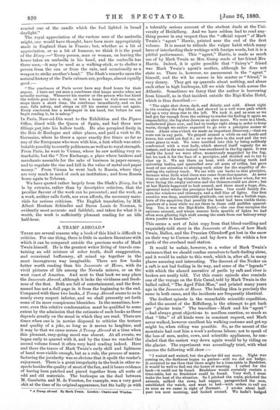THE SHAH'S SECOND VISIT TO EUROPE.*
KINGS, and even Shahs, like other people and things, only attract attention as long as they are novelties. Nothing could exceed the extraordinary amount of interest displayed by Europe on the occasion of the Shah's first visit, if it were not
• d Diary Kept by His Majesty the Shah of Persia, during his Journey to Europe in 1878. London: Bentley.
the lack of interest displayed by the world on the occasion of his second. No doubt the premier pas was of especial interest
in the case of a Sovereign who had never left Persia, the repre- sentative of the oldest dynasty in the world, none of whom had ever visited Western Europe,—the mysterious Shah-han-Shah, about whom so much was talked a few years ago, and about whom no one ever thinks of speaking now. But still his Majesty must have been somewhat disappointed at finding how much less was made of him when Europe knew what to expect in him, than when he was still a novelty and a surprise, when stories where bandied about concerning the size of the diamonds on the breast of his coat and the height of the aigrette he wore in his head-dress, about the number of wives that were per- mitted to accompany him, and the peculiar customs which necessitated the killing of sheep by his private butcher in one of the drawing-rooms at Buckingham Palace.
And a certain amount of this disappointment is visible in the second Diary. The outrage on the Emperor hurried the Shah
away from Berlin ; Paris was too full of Exhibition sightseers, royal, gentle, and simple, to pay much attention to him. He did
not come to London ; Vienna seems to have been somewhat flat ; and in Russia only does he appears to have derived any great satisfaction from the interest he created. Indeedaalmost the only serious lesson to be learnt from this royal Diary—a diary of a dull and uneventful tour, written in a style which is naive and simple to the extent of absolute childishness—is that the Shah of Persia has an affection for the Tsar of All the Russias, and feels more or less at home among his subjects ; and that the friendship and good-will of the Sovereign of Persia are culti- vated, and with great success, by the Court of St. Petersburg. On his arrival at Moscow, for instance, he writes,- " I saw an immense crowd of people, which had collected in spite of the heavy rain. But suddenly, at the moment of my stepping into the carriage to go to the Kremlin, the rain ceased. The delight of the people was great, and as we passed there arose tremendous cries of 'Hurrah !' and an indescribable shouting ; verily, it must have been from excess of pleasure and quite spontaneous."
And after this occur the naive remarks—almost immediately succeeding each other,-
" The Kremlin was the same as it was five years ago, and as I have described it already in my previous journal, there is no need of my
doing so again A woman who dances very well, and whom I had previously seen, when I was here five years ago, danced again to-night."
Theatrical representations seem to have been particularly pleasing to the royal traveller, and his resume of a play he saw at St. Petersburg is characteristic enough to be quoted at length :—
"The play treated of the son of a king, who lost his way in a desert, and found himself in an enchanted place. He sat down on a bewitched seat, became mad, and fell asleep. Witches and fairies. then arrived, and brought the prince a pipe and other articles. Beautiful women, in splendid dresses, danced round him, sang and made love to him, and then all suddenly vanished. The play con- tinned like this to the end, and was excellent throughout, with ita beautiful dancing and lovely singing. It lasted a long time."
This last sentence is delightfully suggestive.
But the performances at a Circus could not last too long for his Majesty. He describes them as "really magnificent." He finally left Russia in the Tsar's great-coat, and he notes in his. Diary :—
" As my paletot was not ready when we reached the foot of the palace stairs, the Emperor threw his own over my shoulder. I put it on, and said, Now that I wear your paletOt, I am sure that my journey will be an auspicious one? The Emperor and I then entered an open carriage, and we left. Great crowds had assembled in the streets, and shouted Hurrah!' as we went by."
The Order of the Lion and the Sun must be pretty common in Russia at present. The Shah seems to have decorated every
officer he saw ; one notes, as an example, that at Erivan, a town near the frontier, he decorated "all the military and other- officers, every one, according to his grade and rank."
The Shah's visit to Berlin, as we have said, was cut short by Nobiling's attempt upon the Emperor's life ; and the greater- part of the chapter or section on Germany is taken up with a. minute account of how little his Persian Majesty shot, and how much he perspired as, rifle in hand, he chased bucks in the woods near Baden-Baden.
The first thing that struck him in Paris, very naturally, was- the electric light, concerning which he makes the following- reflection, which, as a royal dictum, might perhaps be adapted by Mr. Edison as the motto of one of his companies :—" The gas lamps burning side by side with the electrical lamps,. remind one of the candle which the fool lighted in broad daylight." The royal appreciation of the various uses of the umbrella
might, one would have thought, have been more appropriately made in England than in France; but, whether as a bit of appreciation, or as a bit of humour, we think it is the pearl of the Diary :—" Every person, man or woman, on leaving the house takes an umbrella in his hand, and the umbrella has three uses,—it may be used as a walking-stick, or to shelter a person from the sun or from the rain, and occasionally as a weapon to strike another's head." The Shah's remarks upon the natural history of the Paris cabmen are, perhaps, almost equally good :— " The coachmen of Paris never have any fixed hours for their repose. I have not yet seen a coachman that keeps awake when not actually moving. Whenever his master or the person who has hired the vehicle goes into a shop, or into a house to visit some one, or stops there a short time, the coachman immediately, and on his seat, falls asleep, and sleeps on till his master comes out again. Every coachman has a newspaper in his hand, but before he can 'begin reading it, he is asleep."
In Paris, Nasr-ud-Din went to the Exhibition and the Figaro Office, dined with the Queen of Spain, and had three new fillings put into his hollow tooth. He also perspired freely in the Bois de Boulogne and other places, and paid a visit to St. Germains, where he threw a spear exactly five times as far as any of the Europeans who were with him, a feat which was attri-
butable possibly to courtly politeness, as well as to royal strength. From Paris, he went to Vienna, where he saw nothing very re- markable, but the " New Exchange, a place where bankers and merchants assemble for the sake of business in paper-money, and to regulate the rise and fall in the value of metal and paper money." From Vienna he went back to Russia, where they are very much in need of such an institution; and from Russia home again to Teheran.
We have quoted rather largely from the Shah's Diary, for it is by extracts, rather than by descriptive criticism, that the peculiar flavour of the work can be presented; and the work, as a work, neither calls forth, nor even affords, the necessary mate- rials for serious criticism. The English translation, by MM. Albert Houtum Schindler and Baron Louis de Norman, is .evidently most accurate and faithful ; and taken for what it is worth, the work is sufficiently pleasant reading for an idle half-hour.



































 Previous page
Previous page